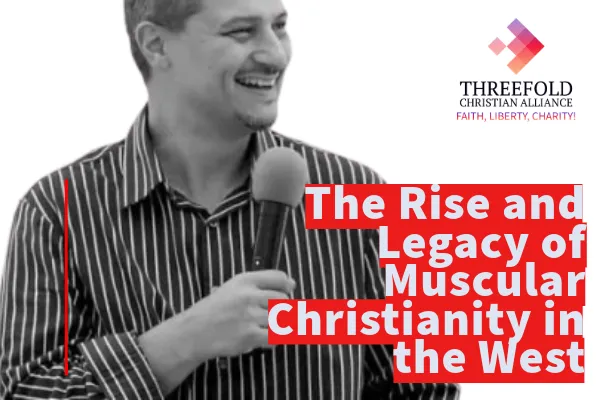
The Rise and Legacy of Muscular Christianity in the West
Muscular Christianity emerged as a distinctive religious and cultural Western movement in the mid-19th century, blending Christian faith with ideals of physical vigor, discipline, and masculinity. It sought to counter perceptions of Christianity as overly passive or effeminate by promoting a robust, action-oriented piety that emphasized patriotic duty and self-sacrifice. This philosophy profoundly influenced Western society, shaping everything from sports and physical education to gender roles, patriotism, and even imperialism. By examining its origins, principles, and impacts, we can better understand how Muscular Christianity transformed Western culture, leaving a legacy that persists in contemporary debates about faith, fitness, and identity. As you read, ask yourself--just how much have we drifted away from its legacy. Something to think about.
History of Muscular Christianity
The roots of Muscular Christianity trace back to Victorian England, where industrialization and urbanization had softened traditional notions of manhood, leading to concerns about a "feminized" church dominated by emotional worship and female participation. Coined in the 1850s, the term gained prominence through writers like Charles Kingsley and Thomas Hughes, whose novel Tom Brown's School Days (1857) idealized athleticism as a path to moral character. Hughes and Kingsley envisioned Christianity as a "manly" pursuit, drawing from New Testament references to discipline and endurance.
The movement spread rapidly across the Western world, particularly to the United States by the late 19th century, where it aligned with progressive-era reforms. Figures like evangelist Billy Sunday, a former baseball player, and organizations such as the Young Men's Christian Association (YMCA) institutionalized it, promoting gyms and sports as tools for spiritual growth. By the early 20th century, it had evolved amid world wars and social changes, influencing educational systems and missionary efforts, though it waned post-World War II before seeing revivals in modern evangelical circles.
Key Principles
At its heart, Muscular Christianity fused physical strength with spiritual fortitude, positing that a healthy body was essential for a virtuous soul. Drawing from biblical passages like 1 Corinthians 6:19-20, which describes the body as a temple of the Holy Spirit, proponents argued that athletic discipline built moral resilience, combating idleness and vice. Masculinity was central, emphasizing traits such as courage, self-control, and leadership—qualities seen as mirroring Christ's own resolve.
Other core tenets included patriotic duty and self-sacrifice, where physical prowess served national and imperial goals, and a rejection of perceived effeminacy in faith. This holistic view extended beyond men, though it primarily targeted them, promoting a "vigorous" Christianity that integrated faith into everyday action. Such principles prompt reflection: Does equating strength with spirituality risk oversimplifying complex human experiences?
Influence on Sports and Physical Education
Muscular Christianity revolutionized sports and physical education in the West by framing athleticism as a moral imperative. It propelled the rise of organized team sports, such as rugby and football, in British public schools, where games were viewed as builders of character and discipline. In the United States, it influenced the YMCA's establishment of gyms and basketball's invention by James Naismith in 1891 as a "clean" sport for young men.
The movement also shaped physical education curricula, shifting from gymnastics to team-based activities that emphasized fitness for citizenship and evangelism. It contributed to the modern Olympic revival in 1896, promoting international competition as a display of Christian values.
Impact on Society
Muscular Christianity left an indelible mark on Western society, reinforcing rigid gender roles by idealizing men as strong protectors and women as domestic supporters. It bolstered patriotism, portraying physical readiness as a civic duty, which aligned with nationalist sentiments during world wars. Missionaries used sports to civilize colonies, exporting Western values which were made part and parcel of Christian benevolence. Overall, it embedded a "deep structure" of masculinity in societal institutions, from military training to education.
Legacy and Modern-day Relevance
The legacy of Muscular Christianity endures in Western culture, evident in sports ministries like the Fellowship of Christian Athletes and evangelical emphasis on disciplined living. It informs contemporary discussions on masculinity, with revivals in books and movements advocating "biblical manhood" amid perceived crises in male identity. In modern society, its principles appear in fitness culture tied to faith, such as church-based wellness programs, and debates over gender in sports.
However, it has evolved, with some adaptations addressing ongoing issues like mental health and community building through physical activity. ?
Muscular Christianity profoundly changed the West by intertwining faith with physicality, influencing sports, physical education, gender roles, patriotism, and imperialism while sparking enduring controversies over exclusion and violence. Its legacy in Western culture—from organized athletics to modern masculinity discourses—highlights the role of faith in shaping societal values. Have we lost this legacy? Should we try to reclaim it?
